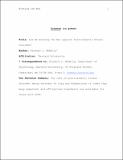| dc.contributor.author | McNally, Richard J. | |
| dc.date.accessioned | 2012-06-22T18:20:16Z | |
| dc.date.issued | 2012 | |
| dc.identifier.citation | McNally, Richard J. 2012. Are we winning the war against posttraumatic stress disorder? Science 336(6083): 872-874. | en_US |
| dc.identifier.issn | 0036-8075 | en_US |
| dc.identifier.issn | 1095-9203 | en_US |
| dc.identifier.uri | http://nrs.harvard.edu/urn-3:HUL.InstRepos:8916494 | |
| dc.description.abstract | The most methodologically rigorous epidemiological study on American military personnel deployed to Iraq and Afghanistan found that 4.3% of troops developed posttraumatic stress disorder (PTSD). Among deployed combatants, 7.6% developed PTSD, whereas 1.4% of deployed noncombatants did so. The U.S. Department of Veterans Affairs has launched a program ensuring that all veterans with PTSD will receive evidence-based cognitive-behavioral therapy, and the Army has developed Battlemind postdeployment early interventions that reduce risk for the disorder. | en_US |
| dc.description.sponsorship | Psychology | en_US |
| dc.language.iso | en_US | en_US |
| dc.publisher | American Association for the Advancement of Science | en_US |
| dc.relation.isversionof | doi:10.1126/science.1222069 | en_US |
| dash.license | OAP | |
| dc.title | Are We Winning the War against Posttraumatic Stress Disorder? | en_US |
| dc.type | Journal Article | en_US |
| dc.description.version | Author's Original | en_US |
| dc.relation.journal | Science | en_US |
| dash.depositing.author | McNally, Richard J. | |
| dc.date.available | 2012-06-22T18:20:16Z | |
| dc.identifier.doi | 10.1126/science.1222069 | * |
| dash.contributor.affiliated | McNally, Richard | |


